The benefits and harms of beets for the human body: how, how much and in what form it is better to eat a vegetable
Back in the 2000s BC, this vegetable was used for medicinal purposes. Avicenna, Paracelsus and Hippocrates used it in their recipes. Much later, it began to be served at the table, but its healing properties are appreciated to this day.
It will help eliminate anemia, increase potency, reduce pain on critical days, and improve the condition of cancer and other diseases. What kind of plant are we talking about? Today we will talk about table beets - a delicious and healthy product.
The content of the article
Red beets are great for health
The degree of benefit and harm beets largely depends on the state of the body, individual characteristics, acute or chronic nature of the disease, if any. In food they use not only the root vegetable itself in boiled or raw form, but also its tops, juice or decoction.
A raw product is healthier
Almost any vegetable or fruit is more beneficial when eaten raw than cooked. When exposed to high temperatures, many vitamins and minerals are destroyed. Raw beets and their juice have beneficial properties such as:
- normalization of arterial pressure;
- improvement of vision;
- prevention of blood clots;
- cleaning and regeneration of cells liver.
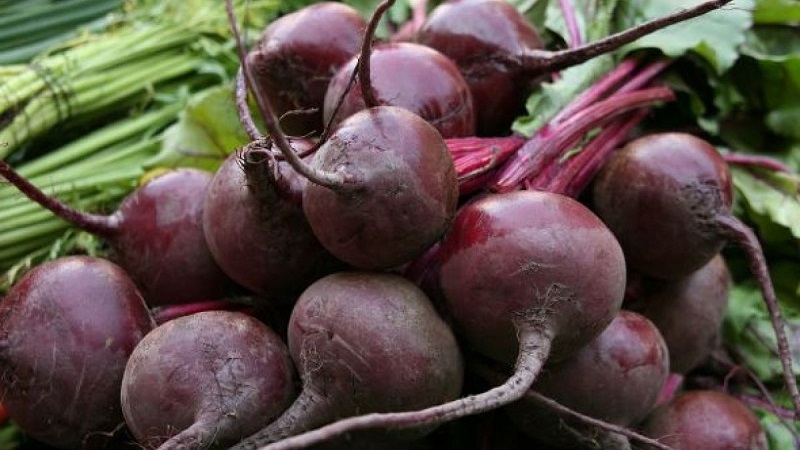
Boiled no worse
Unlike other vegetables, when cooking beets, they almost do not lose their beneficial properties, but only become a little more high-calorie. A thermally processed vegetable has the following properties:
- improves blood composition and compensates for iron deficiency;
- B vitamins, which are part of the vegetable, have a beneficial effect on the nervous system, therefore, beets have a calming effect;
- the vegetable is famous for its antioxidant properties, thanks to which it inhibits the aging process in the body;
- has a beneficial effect on the digestive system, eliminates congestion in the intestines.
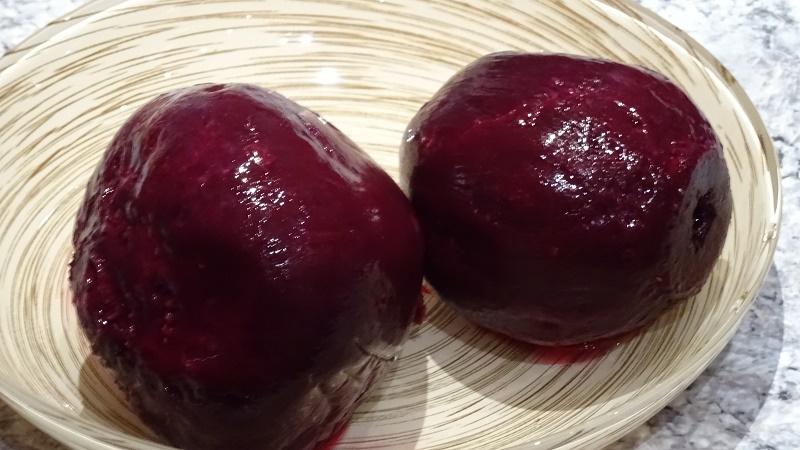
What is useful, what's inside
Beets are rich in trace elements and vitamins necessary for the normal functioning of the body. The beneficial effect of the vegetable extends to almost all systems and internal organs.
What are the usefulness
The above properties should not be so rigidly divided into those inherent in processed and raw products. Useful qualities in both cases are approximately the same with only one difference. In a raw vegetable, the concentration of nutrients is higher, but it is more aggressive to the digestive tract. The thermally processed product is softer.
Common properties include:
- benefits for the female reproductive system, especially during menstruation;
- beneficial effect on the prostate gland;
- anti-inflammatory effect both when taken orally and when applied externally;
- beets contain a lot of iodine, so it is useful for those who have problems with the thyroid gland from a lack of this element in the body;
- keeps the immune system in good shape;
- low calorie content allows the use of beets in dietary nutrition.
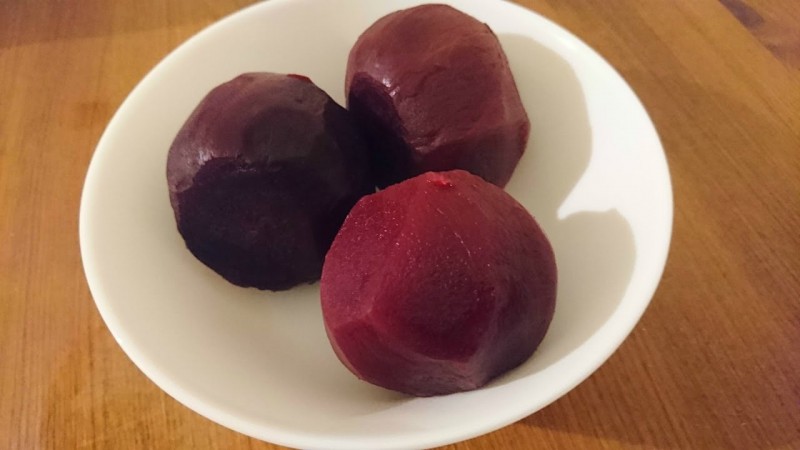
What is rich in burgundy vegetable
The table below shows the composition of important nutrients in the root vegetable.
| Vitamins | Trace elements | Macronutrients | Organic acids |
| Vitamin B group | Iodine | Potassium | Sorrel |
| RR | Iron | Magnesium | Apple |
| FROM | Zinc | Sodium | Folic |
| AND | Manganese | Phosphorus | |
| Betaine | Selenium | Calcium |
Counting calories
100 g of beetroot contains only 43 kcal. The percentage of proteins, fats and carbohydrates:
- proteins - 1.6 g (3.02% DV)
- fats - 0.2 g (1.95% DV)
- carbohydrates - 6.8 g (5.31% DV).
Here is such a healer
Beets are useful for treating liver and gastrointestinal tract diseases, hypertension, anemia and other diseases. There is even a positive experience of using root crops in the treatment of cancer. The methods of taking and the norms of using herbal medicine are different. We will talk about them below.
Note! Beets with a high content of chemicals will not only do no good, but also harm. Vegetables are best grown in a summer cottage or bought from trusted sellers.
Useful for the digestive tract
Beets are used to treat the gastrointestinal tract. Fiber, which it is rich in, removes toxins, which contributes to the normalization of the intestinal microflora.
Preparation of the product: in equal shares take cognac, honey, carrot and beet juices, mix the ingredients - the product is ready.
Application: use three times a day 30 minutes before meals.
The liver will say thank you
Beet broth will help cleanse the liver and restore its functions. It also promotes tissue regeneration.
Preparation: the washed medium beets are boiled in 3 liters of water until the volume of the liquid is reduced by 2/3. The finished beets are chopped on a grater, added to the resulting broth, boiled for another 20 minutes and filtered.
Application: the broth is divided into four equal parts and taken during the day. Ideally, after taking it, you need to apply a heating pad to the liver area and lie down a little on your right side.
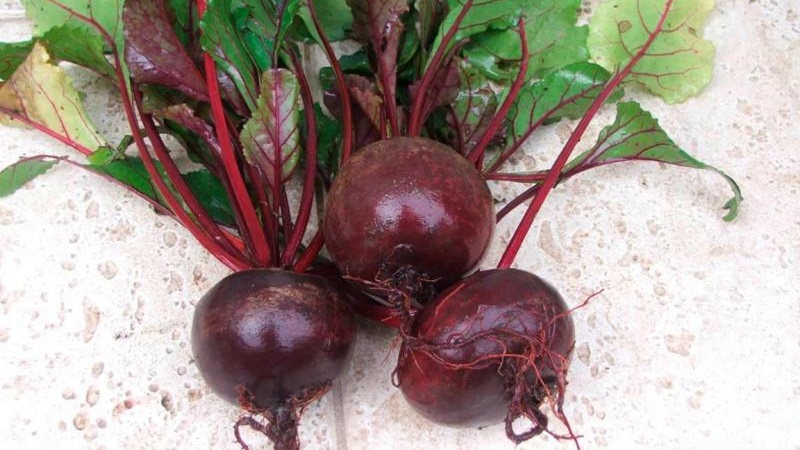
To help cancer patients
There is an opinion, confirmed by several studies, that burgundy vegetables can slow the growth of cancer cells and even reduce swelling. Beetroot helps, if not cure, then at least improve the condition of cancer patients. The most useful beetroot medicine is considered for cancers of the rectum, bladder, stomach and lungs. The use of the vegetable also reduces the side effect of radiation therapy.
For treatment, use freshly prepared beet juice.
Application: start treatment with small doses, for example, with 1 teaspoon or tablespoon, and gradually bring up to 500-600 ml, dividing the intake into doses of 100 ml. They drink the medicine 30 minutes before meals. Its joint use with sour drinks and bread with yeast is contraindicated. The duration of treatment is 12 months, then the dose is reduced to 200 ml and continues to drink as a prophylactic agent.
It is important! Do not forget that you should consult your doctor before using any traditional medicine.
For harmony of forms
Opinions about whether it is possible to lose weight with the help of beets vary, because this vegetable is sweet. IN the benefits of its use for weight loss are indicated by two factors:
- The content of betaine, which is very often used in pharmaceutical preparations for weight loss.
- The ability of the "burgundy doctor" to remove toxins, normalize cholesterol and the digestive tract. Thanks to the latter quality, metabolic processes are restored, which contributes to a decrease in body weight.
For weight loss, beet juice diluted with water or other non-acidic juice in a ratio of 1/10 is also used. They begin to take the juice with very small portions and bring to a quarter of a glass.
It is also useful to introduce dishes with vegetables into the diet. Beetroot cocktail also has fat-burning properties. For its preparation you will need: medium or small beets with tops, orange, green apple, 1 tbsp. l. honey, a large pinch of ginger, a glass of water or almond milk. All the ingredients are thoroughly washed and cut, the peel is removed from the orange and divided into slices, then crushed with a blender - a delicious and healthy cocktail is ready.
It is important! Beet juice should not be taken immediately after preparation: it will contain many heavy and even harmful compounds for the body. When drinking freshly made juice, vasospasm can occur. To get rid of negative substances and get the maximum benefit, the product is left to stand in an open container for at least two hours.
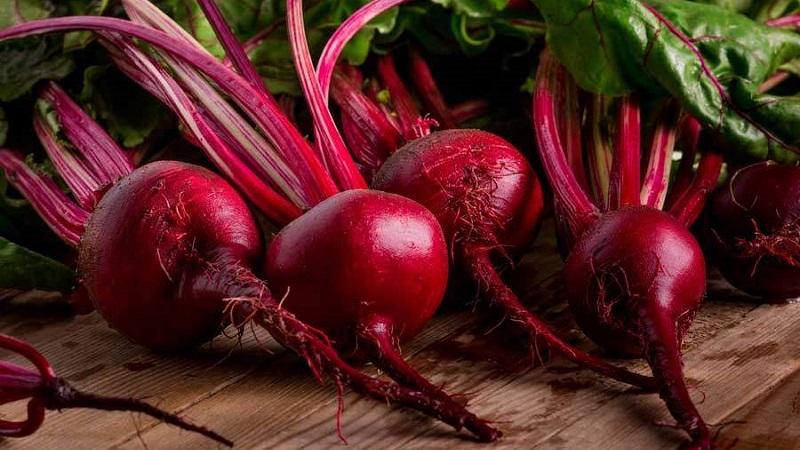
For men, women and children
The spectrum of useful properties of table beet is very wide. Funds based on it contribute to the speedy healing and significant relief of the symptoms of diseases. Let's talk about the benefits of a vegetable for both sexes and children.
The strong half
The burgundy vegetable has long been recognized as an excellent prophylactic agent in the fight against the main male problem - prostate disease. In addition, beets increase libido and have a positive effect on potency.
The ability of our "heroine" to cleanse the intestines from pathogenic microflora and congestion helps to avoid inflammation and keep the prostate gland healthy. It also protects against urological inflammation. To achieve a sustainable effect, representatives of the strong half of humanity should include beets in their diet. Side dishes and salads with the addition of a burgundy vegetable, consumed regularly, also have a positive effect.
Folk remedies also show themselves remarkably, for example: freshly squeezed juice of one vegetable is mixed with carrots and ginger chopped in a blender (up to 2 cm of root), a small amount of cream is added and diluted with apple or orange juice (also fresh). The resulting composition is drunk daily in the morning.
For female beauty and not only
One of the most valuable properties of beets for women is its ability to normalize the menstrual cycle and hormones. Folic acid, B-vitamins, iron in the vegetable help reduce nervousness in PMS. And during the critical days themselves, the pain syndrome decreases.
These vitamins are indispensable for pregnant women. In addition, beets help relieve puffiness and normalize iron levels. Beetroot will also help to keep high blood pressure, which also often rises towards the end of the term, without medication.
The vegetable is also used for cosmetic purposes for hair, scalp and face. For example, beet masks perfectly eliminate inflammatory processes on the skin of the face.
Preparation: grated medium potatoes, add wheat flour and dilute with beet broth.
Mode of application: the creamy product is applied to the skin for 10 minutes, then washed off with water, diluted in half with milk.
Of course, beets also help nursing mothers recover from pregnancy and childbirth. But it shouldn't be abused:
- because of the property to slow down the absorption of calcium (this should be taken into account by pregnant women);
- Brightly colored foods such as beets often cause allergic reactions.
Therefore, nursing women need to be on the lookout and closely monitor the condition of the baby so that at the slightest sign of allergy they stop taking the vegetable. The same goes for the child's digestive system. If his tummy began to bother him or the stool became too frequent, the use of the product should be limited.
Note!In delicate situations such as pregnancy or breastfeeding, it is best to consult a specialist before introducing new products.
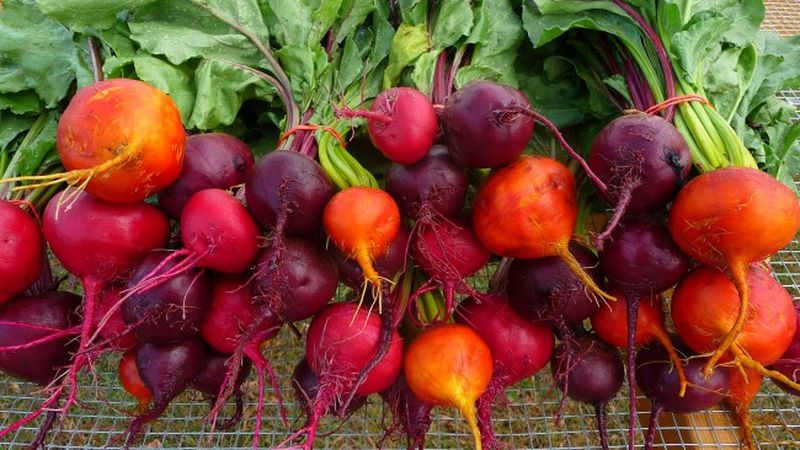
Toddlers will love
Children's doctors recommend getting acquainted with beets from 8 months, but with persistent constipation, you can start earlier - from 5-6 months.
Beetroot is a valuable product, but it should be introduced with caution. It is best to add beet gruel to the mashed potatoes already familiar to the baby. It is advisable to start with 0.5 tsp. and gradually bring to 4-5 tsp.
Ideally, you need to use a new product in the morning so that you can track the reaction of the child's body. In case of complaints about the tummy or an allergic reaction, it is removed from the diet and they try to re-enter it after 1-2 months. With frequent colic or frustration, it is worth postponing the introduction of a new puree for up to a year.
Consumption rates
There is a difference in the rate of consumption of a product for a healthy person and those who have certain problems. So, let's figure out who, how much and how can you eat beets?
How much per day
If there are contraindications, the vegetable is used with caution. It is recommended to eat up to 100-120 g of boiled product (or up to 50 g raw) in the morning 1-2 times a week. Such a norm is allowed even for patients with diabetes, despite the fact that the vegetable is sweet.
For a healthy adult, the norm is the use of 1-2 boiled root crops per day or 1 glass of juice. The latter, in the absence of contraindications, can be drunk up to 600 ml per day, but in parts.
In baby food, a boiled product is preferable, since raw is too concentrated. If juice is used, then diluted (for constipation). For babies under one year old, five tablespoons of mashed potatoes twice a week are enough. After a year, the beetroot menu can be diversified and the daily intake can be brought to 50 g by three years, and up to 100 g by four.
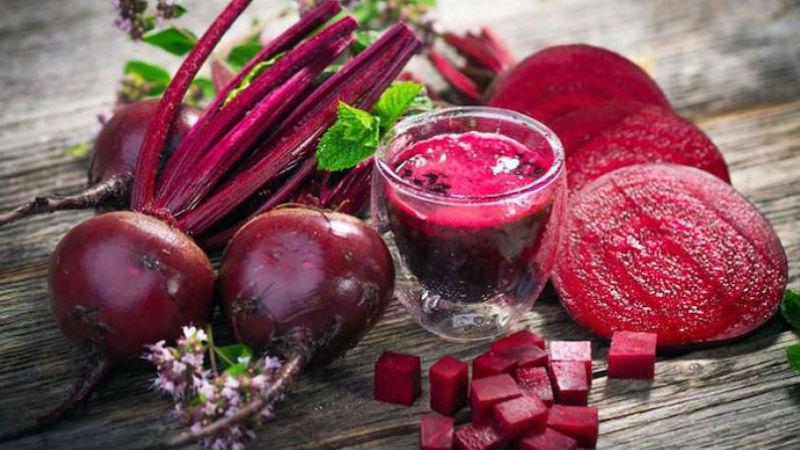
About dangers and contraindications
There are contraindications to the use of beets, because in some cases it can cause significant harm to the body. First of all, the reason for the rejection of such a useful product may be individual intolerance or allergic reactions of the body.
It is not recommended to abuse the vegetable and diabetics, as it contains a lot of glucose. And foods containing a large amount of sugar worsen the patient's condition.
Traditional medicine is replete with recipes with beets for kidney stones. But the oxalic acid contained in it is capable of provoking a deterioration in the patient's condition instead of healing: calculi can begin to actively form and grow.
Beets reduce the absorption of calcium, so it is especially harmful to abuse it for diseases such as osteoporosis. With too frequent use of beets, calcium is absorbed by the body much worse.
Gastritis with high acidity is another reason to think about whether it is worth introducing a product into the diet on an ongoing basis. Organic acids of the vegetable contribute to an increase in gastric secretion, which provokes a deterioration in the condition.
Under reduced pressure, beets are also contraindicated. A vegetable can very quickly lower blood pressure to a critical point, and urgent medical attention is required.
With increased thyroid function, uncontrolled consumption of vegetables is dangerous. There is a risk of harming the body, in which there is already an excess of iodine, and the product is rich in them.
Since beets, especially raw beets, have a laxative effect, diarrhea sufferers should also not use them until symptoms have resolved.
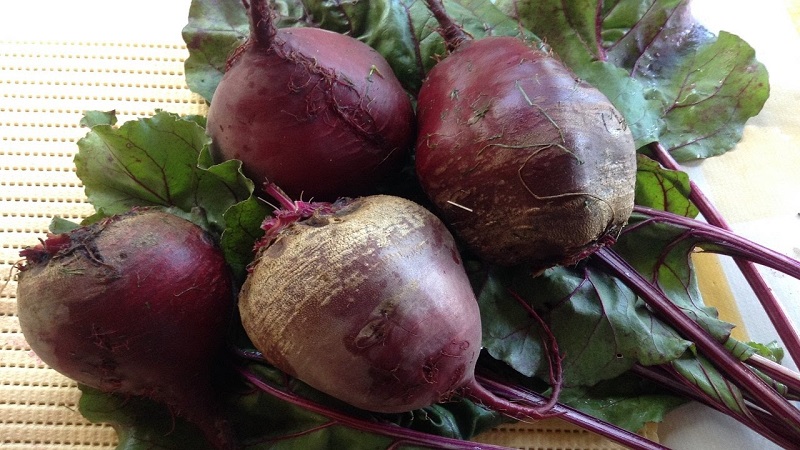
Conclusion
Beetroot is a tasty and healthy product for the human body, enriching the diet with vitamins and improving the condition in many diseases. But, like any traditional medicine, it must be used wisely.
For a successful therapeutic effect, it is necessary to accurately observe the dosage and recommendations. The product does not like fanaticism. The vegetable will help solve problems with the skin of the face, improve the condition of the hair. In addition, it has a beneficial effect on men's and women's health. The main thing is to buy or grow beets in your garden without the use of chemicals.